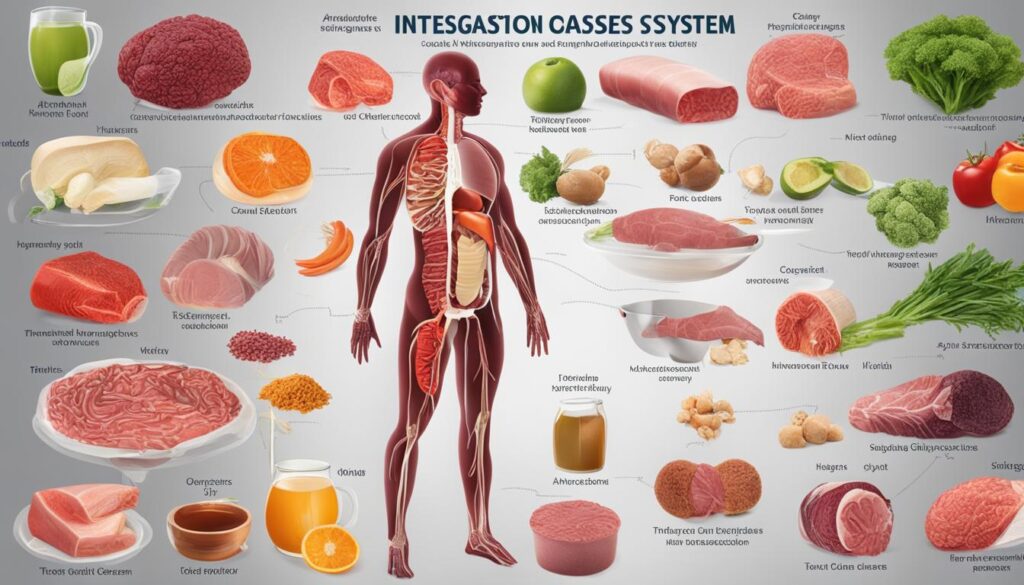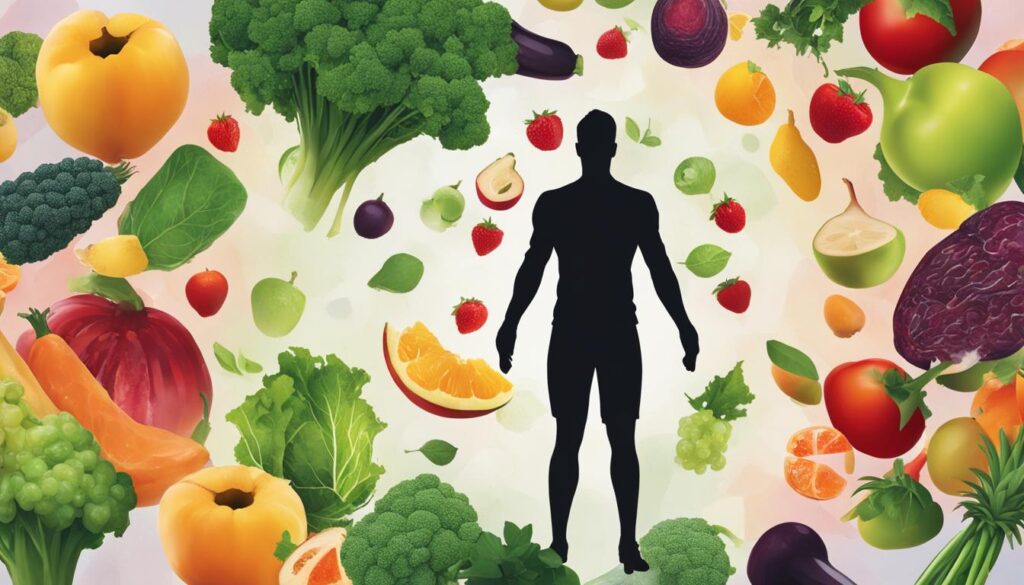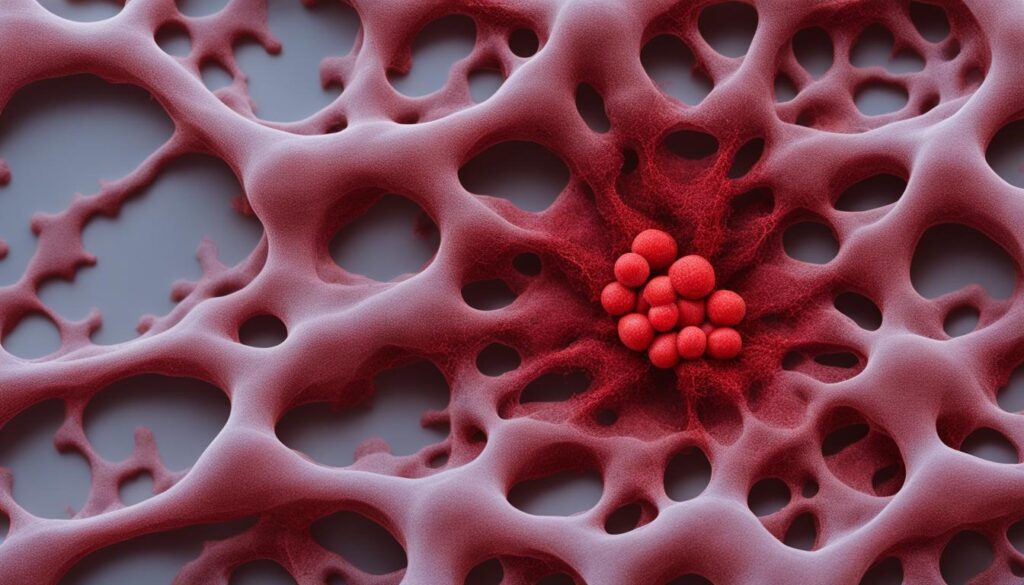When it comes to detox cleanses, there are a lot of questions and misconceptions surrounding their effects on bowel movements and the digestive system. Many people wonder, do detox cleanses really make you poop?
Detox cleanses are often promoted as a way to cleanse the body, improve gut health, and promote overall wellness. However, the actual impact of detoxification on bowel movements can vary from person to person. In this article, I will explore the effects of detox cleanses on the digestive system and discuss whether they actually make you poop.
Before diving into the details, let’s first understand the detoxification process and its connection to the digestive system. Detoxification involves eliminating toxins from the body, often through the liver, kidneys, and skin. While detox cleanses can support this process, their effects on bowel movements may not be as straightforward as some believe.
Key Takeaways:
- Detox cleanses have varying effects on bowel movements.
- The impact of detoxification on the digestive system differs from person to person.
- Understanding the detoxification process is essential to evaluate its impact on bowel movements.
- Many misconceptions surround the relationship between detox cleanses and poop.
- Consulting a healthcare professional is crucial before starting any detox cleanse.
Common Misconceptions About Detoxification
When it comes to detoxification, there are several myths and misconceptions that need to be debunked. Let’s take a closer look at some of the most commonly believed misconceptions about detoxing:
- Myth: Detoxing helps in fat burning.
- Myth: Detoxifying drinks and supplements are FDA approved.
- Myth: Fermented beverages detoxify the intestines.
- Myth: Laxatives effectively eliminate toxins.
- Myth: Home detoxes are safe and effective.
The truth is, most detox techniques primarily focus on eliminating waste products through bowel movements, which does not lead to fat burning. Detoxing alone is not a sustainable weight loss method. It should be combined with a balanced diet and regular exercise to achieve desired weight loss goals.
Detox products that claim to be shortcuts to successful detoxification may not be regulated or approved by the FDA. It is crucial to consult a qualified professional before incorporating such products into your detox routine.
While fermented beverages like kombucha have gained popularity as detoxifiers, they can actually pose health risks if not prepared properly. It is important to be cautious and ensure the safety of any fermented products you consume.
Using laxatives as a form of detox is another common myth. While laxatives can soften stool and promote bowel movements, they do not effectively eliminate toxins from the body. Detoxification requires a comprehensive approach that involves supporting the body’s natural elimination processes.
Detoxing at home without proper guidance and equipment can increase the risk of infection or other complications. It is advisable to seek professional advice before attempting any home detox programs to ensure safety and effectiveness.
By debunking these misconceptions, we can gain a better understanding of detoxification and make informed decisions about our health and wellness.
The Digestive System and How It Works

To understand the impact of detox cleanses on bowel movements, it’s important to have a basic understanding of the digestive system. The digestive process involves several organs and processes that work together to break down food, absorb nutrients, and eliminate waste.
The journey of food begins in the mouth, where it is chewed and mixed with saliva. Saliva contains enzymes that help break down carbohydrates. From the mouth, the food travels down the esophagus and enters the stomach.
In the stomach, the food is further broken down by stomach acid and enzymes. This process helps to break down proteins into smaller molecules that can be easily absorbed by the body. The resulting mixture, known as chyme, then moves into the intestines.
The intestines are where the majority of digestion and absorption occur. The small intestine is responsible for most nutrient absorption, including proteins, carbohydrates, fats, vitamins, and minerals. Water is also absorbed in the small intestine. The remaining undigested material and waste products then move into the large intestine.
The large intestine primarily absorbs water and electrolytes from the waste material, forming solid stool. It also houses a diverse community of gut bacteria that assist in the breakdown of undigested material and produce essential nutrients. These beneficial bacteria, along with fiber in the diet, help regulate digestion and promote overall gut health.
Key Components of the Digestive System:
| Organ | Main Function |
|---|---|
| Mouth | Chewing and mixing food with saliva |
| Stomach | Breaking down food with acid and enzymes |
| Intestines (small and large) | Nutrient absorption and waste processing |
| Gut Bacteria | Aiding in digestion and producing essential nutrients |
The digestive system is a complex and intricately balanced system that ensures our bodies receive the nutrients they need to function properly. Optimal digestion is essential for overall health and well-being.
How Detox Cleanses Affect Bowel Movements
Different types of detox cleanses can have varying effects on bowel movements. Let’s explore how detox cleanses impact the frequency and consistency of bowel movements.
Fiber and Water Intake
Most detox cleanses involve increasing water intake and consuming higher amounts of fiber-rich foods. Fiber acts as a natural cleanser for the digestive system, promoting healthy bowel movements. It adds bulk to the stool, easing its passage through the intestines and preventing constipation.
Additionally, water plays a crucial role in softening the stool and preventing dehydration, which can lead to constipation. Adequate water intake supports the overall detoxification process by flushing out toxins and waste products from the body.
Calorie Restriction and Stool Changes
During a detox cleanse, calorie restriction is often part of the program. This calorie deficit can lead to the burning of stored fat for energy. As a result, changes in stool production and consistency may occur. Some individuals may experience looser stools or even temporary diarrhea due to the breakdown of fat stores.
It’s important to note that rapid or excessive weight loss can have negative effects on bowel movements. It’s crucial to follow a detox cleanse plan that is well-balanced and provides adequate nutrition to support optimal bowel function.
Detox Symptoms and Diuretic Effects
Detox cleanses can also cause detox symptoms, which may include changes in bowel movements. These symptoms are often a result of the body eliminating toxins and waste products.
Furthermore, if a detox cleanse includes the consumption of caffeinated beverages or supplements, the diuretic effects of caffeine can further stimulate bowel movements. Caffeine acts as a natural laxative, increasing the frequency of bowel movements.
Individual Variations
It’s important to recognize that individual experiences with detox cleanses may vary. While many individuals may experience more frequent bowel movements and changes in stool production, some may not notice significant effects on their bowel habits during a cleanse.
Each person’s digestive system is unique, and factors such as pre-existing conditions, lifestyle habits, and overall gut health can influence how the body responds to a detox cleanse.
Effects of Detox Cleanses on Bowel Movements
| Effect | Description |
|---|---|
| Increased Bowel Movements | Detox cleanses usually involve higher fiber and water intake, stimulating the digestive system and leading to more frequent bowel movements. |
| Changes in Stool Consistency | The burning of stored fat during a cleanse can cause temporary changes in stool consistency, with some individuals experiencing looser stools or diarrhea. |
| Diuretic Effects of Caffeine | If a detox cleanse includes caffeine, the diuretic effects of caffeine can further stimulate bowel movements, increasing their frequency. |
| Individual Variations | Not everyone will experience significant changes in their bowel movements during a detox cleanse. Factors such as pre-existing conditions and gut health can influence individual responses. |
It’s important to listen to your body and make adjustments to your cleanse if needed. If you experience prolonged constipation, diarrhea, or any other discomfort, it’s advisable to consult a healthcare professional.
Remember, the effects of a detox cleanse on bowel movements are temporary. Maintaining a balanced diet, staying hydrated, and practicing healthy lifestyle habits are key factors in promoting regular bowel movements and overall gut health.
Changes in Bathroom Habits During a Detox Diet

When participating in a detox diet, I have observed that there can be noticeable changes in bathroom habits. These changes can be attributed to the adjustments in fiber intake and water consumption that come with a detox diet. Let’s explore how a detox diet can affect bowel movements and overall digestive health.
The higher fiber content found in fruits and vegetables, along with the elimination of foods like meats and dairy, can contribute to more regular and softer stools. Fiber acts as a natural bulking agent and promotes healthy digestion, which can lead to smoother bowel movements.
Did You Know? Dietary fiber helps to add bulk and regularity to the stool, making it easier for waste to move through the digestive system.
However, sudden changes in diet can sometimes cause temporary diarrhea or constipation. This can occur as the body adjusts to the new eating patterns and the increased fiber intake. Establishing a balance between fiber-rich foods and hydration is crucial during a detox diet to support healthy bowel movements.
During fasting periods, such as juice cleanses or water fasting, bowel movements may decrease temporarily due to the reduced food intake. However, once solid food is reintroduced, regular bowel movements typically resume.
The Importance of Hydration
Adequate water intake is essential during a detox diet to support healthy bowel movements. Drinking enough water helps to soften stools and prevent constipation. It also aids in the flushing out of toxins from the body, promoting overall detoxification.
Fun Fact: Water plays a vital role in the digestive process, helping to break down food and absorb nutrients.
While a detox diet can bring positive changes to bathroom habits, it’s important to listen to your body and make adjustments as needed. If you experience persistent diarrhea or constipation during a detox, it is advisable to consult a healthcare professional.
| Fiber Intake: | Water Intake: | Change in Diet: | Bowel Movements: |
|---|---|---|---|
| Higher intake of fiber-rich foods. | Adequate water consumption supports soft stools and regular bowel movements. | Elimination of certain foods like meats and dairy. | Potential for more regular and softer stools. |
| Temporary adjustments may result in diarrhea or constipation. | Ensuring hydration is vital to support healthy bowel movements during a detox diet. | Body adapts to new eating patterns and fiber intake. | Temporary decrease in bowel movements during fasting, which resumes with reintroduction of solid food. |
Detox Symptoms and Body Odor

During a detox, the body may experience detox symptoms as toxins are eliminated from the body. These symptoms can manifest in various ways, including changes in body odor. Body odor is often a result of toxins being released through sweat glands. When toxins are present in the body, they can accumulate in the bloodstream and eventually make their way to the skin, leading to a noticeable change in body odor.
The more toxins present in the body, the stronger the body odor may be. This is because the body is working hard to eliminate the toxins and expel them through various channels, including sweat. Sweating is an important mechanism for the elimination of toxins, as it helps to flush them out of the body.
One way to support the elimination of toxins through sweat is by drinking plenty of water. Water helps to hydrate the body and dilute toxins in the bloodstream, making them easier to eliminate. Staying hydrated also promotes healthy kidney function, as the kidneys play a crucial role in filtering out toxins and waste products from the blood.
The Importance of Water Intake
Drinking an adequate amount of water is essential during a detox to support the body’s natural detoxification processes. Water helps to flush out toxins through urine and encourages healthy bowel movements, promoting the elimination of waste products from the body.
“Proper hydration is key to supporting the body’s detoxification processes and reducing body odor during a detox.”
In addition to supporting detoxification, water intake also helps to maintain overall health and well-being. It aids in digestion, keeps the body hydrated, helps regulate body temperature, and supports various other essential bodily functions.
It’s important to note that detox symptoms, including changes in body odor, are usually transient and subside after a few days as the body eliminates toxins. However, if detox symptoms persist or worsen, it is recommended to consult with a healthcare professional for further evaluation and guidance.
Remember, while experiencing detox symptoms can be unpleasant, they are a sign that your body is working hard to rid itself of toxins and improve overall health. Through adequate water intake, you can support the elimination of toxins and reduce body odor, ultimately leading to a healthier and more vibrant you.
Swollen Lymph Nodes and Other Detox Symptoms

During a detox, it’s common to experience various detox symptoms as your body works to eliminate waste products and toxins. One specific symptom that may arise is swollen lymph nodes. The lymphatic system, a vital part of the immune system, plays a crucial role in carrying lymph fluid, nutrients, and waste products throughout the body.
When you increase your fiber intake and consume more water during a detox, it can help stimulate the lymphatic system. As a result, your lymph nodes may become swollen as your body eliminates toxins and waste.
To support your lymphatic system and minimize symptoms, it’s essential to maintain a healthy diet and stay hydrated. Fiber-rich foods such as fruits, vegetables, and whole grains can aid in proper waste elimination. Additionally, drinking an adequate amount of water helps flush out toxins through urination and sweating.
Conclusion
In conclusion, detox cleanses can significantly impact bowel movements and the overall function of the digestive system. By increasing water and fiber intake, detox cleanses can promote more frequent bowel movements and changes in stool consistency. However, it’s essential to be aware of detox symptoms that may arise during the detoxification process, such as changes in body odor and swollen lymph nodes. These symptoms are often temporary and indicate that the body is eliminating toxins.
It is crucial to approach detox cleanses with caution and seek guidance from a healthcare professional to ensure safety and efficacy. While detox cleanses can be beneficial for some individuals, it is important to maintain a balanced diet, stay hydrated, and prioritize healthy lifestyle habits to support optimal gut health and regular bowel movements in the long run.
Remember, the key to a healthy digestive system is not solely reliant on detox cleanses but encompasses a holistic approach to overall wellness. By prioritizing proper nutrition, hydration, and maintaining a healthy lifestyle, you can support your digestive system and promote optimal bowel movements naturally.




